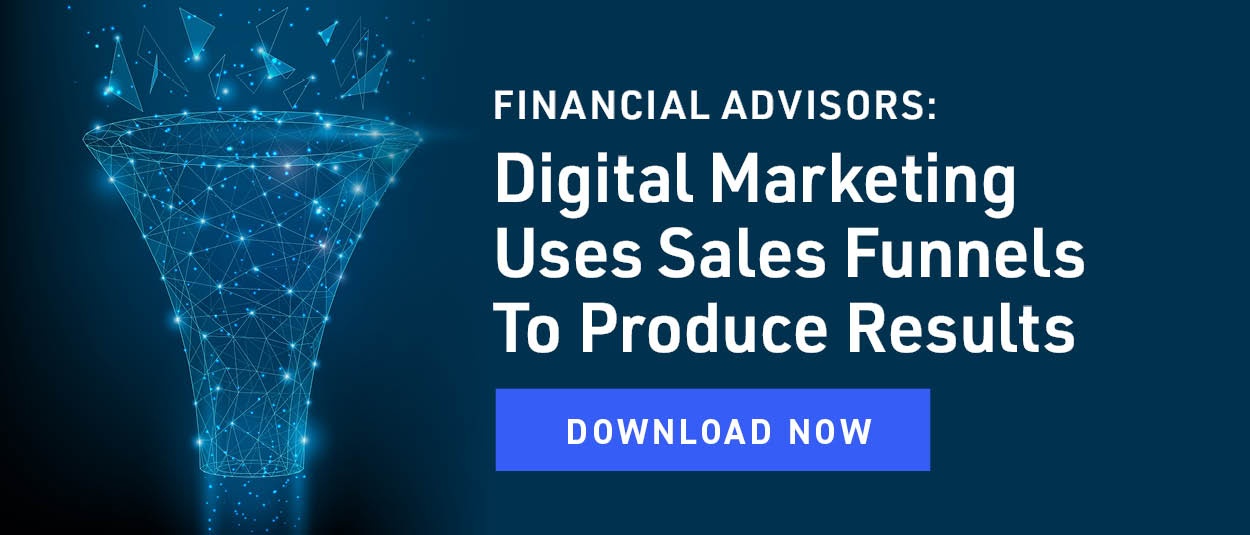

How Many Leads Will Digital Marketing Produce For Financial Advisors?
Most financial advisors do not know what to expect when they hire a digital marketing agency to help them make the Internet a primary source of new clients for their firms. In fact, most financial advisors have low expectations because their current digital marketing efforts are not producing results and they don’t know why.
So, let’s address this issue first. Most financial advisors do not see consistent results for two reasons. First, their websites are online sales brochures. They were not designed to convert visitors into qualified leads.
And second, they have very little online presence so it is difficult for investors to find them on the Internet. Visibility produces the traffic that websites need to produce leads.
When these issues are addressed, financial advisors have the foundations they need to make the Internet a major source of new clients.
The Internet is a Game Changer
It goes without saying the Internet has been a game changer for numerous industries. But, until recently it has not had a big impact on the financial service industry. That is because the industry is dominated by a powerful sales culture that includes 650,000 advisors and representatives, major banks, and insurance companies, not to mention the 40% of CPAs who provide financial planning and other types of financial services.
But, that is changing and the catalyst may have been Covid. The lack of contact between investors and advisors made the Internet a welcome alternative for finding, researching, and contacting financial advisors. And, then there are the Zoom calls to meet and interview advisors. Investors have definitely gotten more comfortable with their digital alternatives.
There is no question the Internet will have a profound impact on the way investors find and screen financial advisors for one major reason. It gives investors more power over the way they find and learn more about advisors. And they can preserve their anonymity when they seek and research advisors.
Two Investor Applications on the Internet
Using the Internet to find and research advisors also fits the way consumers make buying decisions for products and services.
Let’s say they have a need for a particular service. That need could be for medical advice, an electrician, tax services, or financial advice. Where do they go to “find” professionals who provide those services?
In the past it could have been the Yellow pages, ask a friend, or they respond to an advertisement on TV or the radio. In the future that could be a keyword word search on the Internet or a voice search using a mobile device.
They definitely have different avenues for finding service providers, but the Internet is now their number one resource for another reason.
Finding advisors is not the main application that is provided by the Internet. Viewing information about advisors is the main application, so it does not matter where they find advisors - the Internet or a referral from a friend. They will use the Internet to learn more about advisors because that is the prudent thing to do when the decision impacts their future financial security.
If investors use the Internet to research a new restaurant they will certainly use the Internet to research financial advisors.
Your Sales Funnel
When you think of digital marketing, think of it as the top half of your sales funnel and it all starts on the Internet. Investors have to find you to be able to contact you. They enter various keyword combinations or voice commands in Google.
They are presented with a plethora of choices that can be overwhelming. 91.5% of the time they find what they are looking for on page one. Only 4.8% of Google users scroll to page two and 1.1% scroll to page three.
The more visible you are on the Internet the easier you are to find.
What they see on the Internet should bring them to your website. This is the next digital marketing step in your sales funnel. Your online visibility produces traffic for your website. This visibility may be in the form of blog articles, pillar pages, social media, local SEO, or paid advertising campaigns.
This traffic gives your website a one-time opportunity to convert visitors into qualified leads. Financial advisor websites are pivotal because it is their unique role to complete the conversion process. If they fail there are no leads.
Once you have the investors’ contact information your sales process takes over, although in modern times this may be more virtual (Zoom calls) than traditional (face-to-face office meetings).
How Long Does the Digital Marketing Process Take?
There is no one answer for the "how long does it take” question. For example, some financial advisors may be starting from scratch and have zero Internet presence. Other advisors may have a small presence that is producing a trickle of traffic for their websites. But, their current websites are not converting the visitors into leads.
Timelines will vary based on the starting point, location, target markets, minimum asset requirements, keyword assignments, competition, and other factors.
What financial advisors should expect to see, the first few months, is continuous improvement. After a new, lead generation website launches with inbound marketing support every month should be better than the previous month:
- Ranking for more and more keywords
- Higher and higher ranks for the keywords
- Increasing traffic to financial advisor websites
- Improving website conversion rates
All of these factors should be monitored with monthly reports.
Digital marketing is an expense, but it is also a marketing investment that will pay dividends for years. Building and maintaining your presence in the major search engines is your key to success. There are no shortcuts.
Alternative Marketing Strategies
Another way to look at this financial advisor marketing challenge is to identify your alternatives. Outbound marketing (cold calling, direct mail/email) is pretty much obsolete. Caller ID, spam filters, and Covid have had major impacts on the results of this form of marketing - when financial advisors initiate contact with investors. In particular, when investors do not want to be contacted. Rejection rates approach 100%.
If financial advisors’ pockets are deep enough there is traditional advertising: Print, TV, radio. Some advisors rely on referrals, but most of the time they say the frequency of referrals is less than reliable. Some advisors supplement their online SEO (Search Engine Optimization) with SEM (Search Engine Marketing) that funds their paid advertising campaigns.
When you run an ad on the radio you have no idea how many leads that ad will produce. You do know, at any point in time, 5% of investors are seeking to replace their current advisors or hire their first advisors. This is the demand advisors try to reach when they use digital marketing or traditional advertising.
The Future of Marketing
The Internet and digital marketing are the future for how advisors will market financial advice and services to investors and that future is now. The Internet will impact the financial service industry the same way it has impacted other industries.
And, no one expects marketing financial advice to revert back to the pre-Internet days or even the pre-Covid days. There are too many benefits for investors when they use the Internet to find and research financial advisors. Financial advisors will have to be equally adept at virtual and traditional marketing.

Jack Waymire, BA, MBA
Search Here
Categories
- AI (18)
- blogging (2)
- branding (1)
- content (12)
- custodians (1)
- Digital (535)
- email marketing (3)
- fcmo (3)
- fees (1)
- financial advisor marketing (66)
- Google (3)
- Ideas & Tips (125)
- Investor Experience (7)
- lead generation (7)
- linkedin (1)
- Marketing (605)
- newsletters (1)
- Online Transparency (2)
- podcasting (1)
- search engine optimization (4)
- seo (9)
- Social Media (2)
- video (3)
- Websites (172)
- YouTube channel (2)
Recent Posts
-
 October 22, 2025
October 22, 2025 -

-

Top 10 Business Challenges for Smaller Financial Advisor Firms
October 16, 2025 -

How Financial Advisors Use AI to Optimize Website Compliance
October 14, 2025 -

AI Blogging On Your Financial Advisor Website
October 10, 2025

